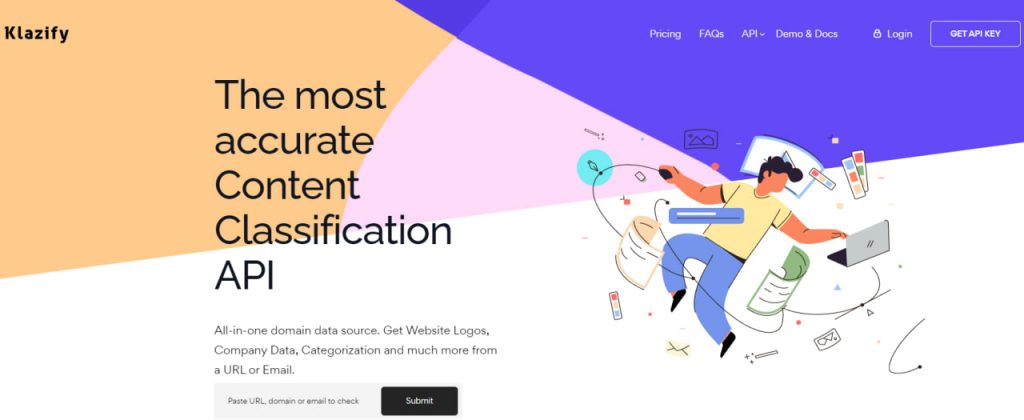In recent years, web scraping has become an increasingly popular way to collect data from websites. However, web scraping can be a time-consuming and complicated process. Thankfully, with the advent of Content Classification APIs, web scraping has become much easier and more efficient.
A Content Classification API is an interface that provides developers with the ability to classify web content. This type of API can be used to extract specific data, such as product descriptions or reviews, from a website. By using machine learning algorithms, the API can analyze the content of a webpage and determine its purpose, type, and relevance.
If you aim to establish a robust online presence, it’s advisable to employ an all-in-one content classification API such as Klazify, which is excellent for web scraping. The API’s seamless integration offers a hassle-free and effective means of conducting accurate web scraping. Klazify simplifies the process of categorizing website content and extracting pertinent information that can aid in enhancing your website’s content and search engine optimization (SEO).

What Are The Uses Of This API?
One of the main benefits of using a web scraping API like Klazify is that it eliminates the need for developers to manually parse HTML or XML code to extract the data they need. Instead, the API can quickly and accurately classify the content of a webpage, making it easy to extract only the information that is relevant to a particular use case.
Another powerful application of this API lies in the field of market research. Companies can use Klazify to scrape websites for data on their competitors, customer behavior, and industry trends. By extracting data from various sources and classifying it, companies can gain insights into their market and make informed decisions about their business strategies.
Another use case for Klazify is in social media monitoring. Companies can use these APIs to monitor social media platforms for mentions of their brand, products, and services. By categorizing these mentions based on sentiment and context, companies can identify potential issues and opportunities and respond in a timely manner.
Finally, it’s important to mention that search engine optimization (SEO) is critical for businesses that want to drive traffic to their websites, and by using Klazify, they can quickly and easily identify the keywords and phrases that are most relevant to their business, making it easier to optimize their website for search engines.
How Does Klazify Work?
Klazify is at its core a content classification API, and it has several dedicated endpoints to perform accurate queries on several fields. The API is tailored to provide a plethora of data about any company with an online presence.
Here’s an example of the resulting endpoint after retrieving a company’s data with the API, all it takes is the company’s URL as input for it to perform the search. In this case, the target of the query was the online streaming service, Twitch:
{
"domain": {
"categories": [
{
"confidence": 0.69,
"name": "/Arts & Entertainment/Online Media",
"IAB1": "Arts & Entertainment"
},
{
"confidence": 0.59,
"name": "/Games/Computer & Video Games/Shooter Games"
},
{
"confidence": 0.54,
"name": "/Online Communities"
}
],
"social_media": null,
"logo_url": "https://klazify.s3.amazonaws.com/19395875071611736404601125541c2e26.19477553.png"
},
"success": true,
"objects": {
"company": {
"name": "Twitch",
"city": "San Francisco",
"stateCode": "CA",
"countryCode": "US",
"employeesRange": "5K-10K",
"revenue": null,
"raised": 35000000,
"tags": [
"Internet",
"Technology",
"Mobile",
"B2C"
],
"tech": [
"google_apps",
"aws_route_53",
"zendesk",
"android",
"postmark",
"ios",
"amazon_ses",
"atlassian_confluence",
"workday",
"talend",
"oracle_peoplesoft",
"salesforce",
"quickbooks",
"sap_hana",
"oracle_data_integrator",
"db2",
"apache_tomcat",
"alteryx",
"atlassian_jira",
"rubicon_project",
"microsoft_dynamics",
"windows_server",
"filemaker_pro",
"oracle_application_server",
"appnexus",
"teradata",
"microsoft_project",
"apache_kafka",
"aws_kinesis",
"aws_redshift",
"hbase",
"informatica",
"rabbitmq",
"oracle_fusion",
"aws_lambda",
"splunk",
"oracle_business_intelligence",
"netsuite",
"aws_dynamodb",
"podio",
"github",
"hootsuite",
"workamajig",
"oracle_cash_and_treasury_management",
"ibm_cognos",
"pentaho",
"sap_concur",
"neo4j",
"grafana",
"sap_crm",
"netsuite_crm",
"apache_cassandra",
"ibm_websphere",
"apache_spark",
"sap_business_objects",
"hp_servers",
"mongodb",
"cision",
"pagerduty",
"couchbase",
"oracle_weblogic",
"openid",
"sas_data_integration",
"oracle_essbase",
"mediamath",
"pivotal_tracker",
"aggregate_knowledge",
"sap_crystal_reports",
"hive",
"sugarcrm",
"oracle_crm",
"microstrategy",
"apache_hadoop",
"vmware_server",
"tibco_spotfire",
"atlassian_crowd",
"aws_cloudwatch",
"couchdb",
"oracle_hyperion",
"peoplesoft_crm",
"postgresql",
"sybase",
"sas_enterprise",
"smartsheet",
"flexera_software",
"trello",
"datadog",
"mysql",
"dropbox",
"salesforce_dmp"
]
}
},
"domain_registration_data": {
"domain_age_date": "2009-06-08",
"domain_age_days_ago": "4880",
"domain_expiration_date": "2024-06-08",
"domain_expiration_days_left": "597"
},
"similar_domains": [
"steamcommunity.com",
"nexusmods.com",
"epicgames.com",
"own3d.tv",
"liquipedia.net",
"wowhead.com",
"gyazo.com",
"hltv.org",
"op.gg",
"twitter.com"
]
}How Can I Get This API?
Klazify can be a game changer for businesses that rely on web scraping to collect data. By eliminating the need for manual data parsing, content classification APIs can save time and improve accuracy, making it easier to extract only the information that is relevant to a particular use case. With its many use cases, Klazify is an invaluable tool for any business that relies on web scraping to collect data.

- Create an account at Klazify’s site. Then select your desired endpoint of choice.
- Use these codes and then call the API. You can get a unique API key on your account dashboard.
- Finally, press the “Run” button and you’re ready! The API response will be on your screen. You can also choose a programming language.

